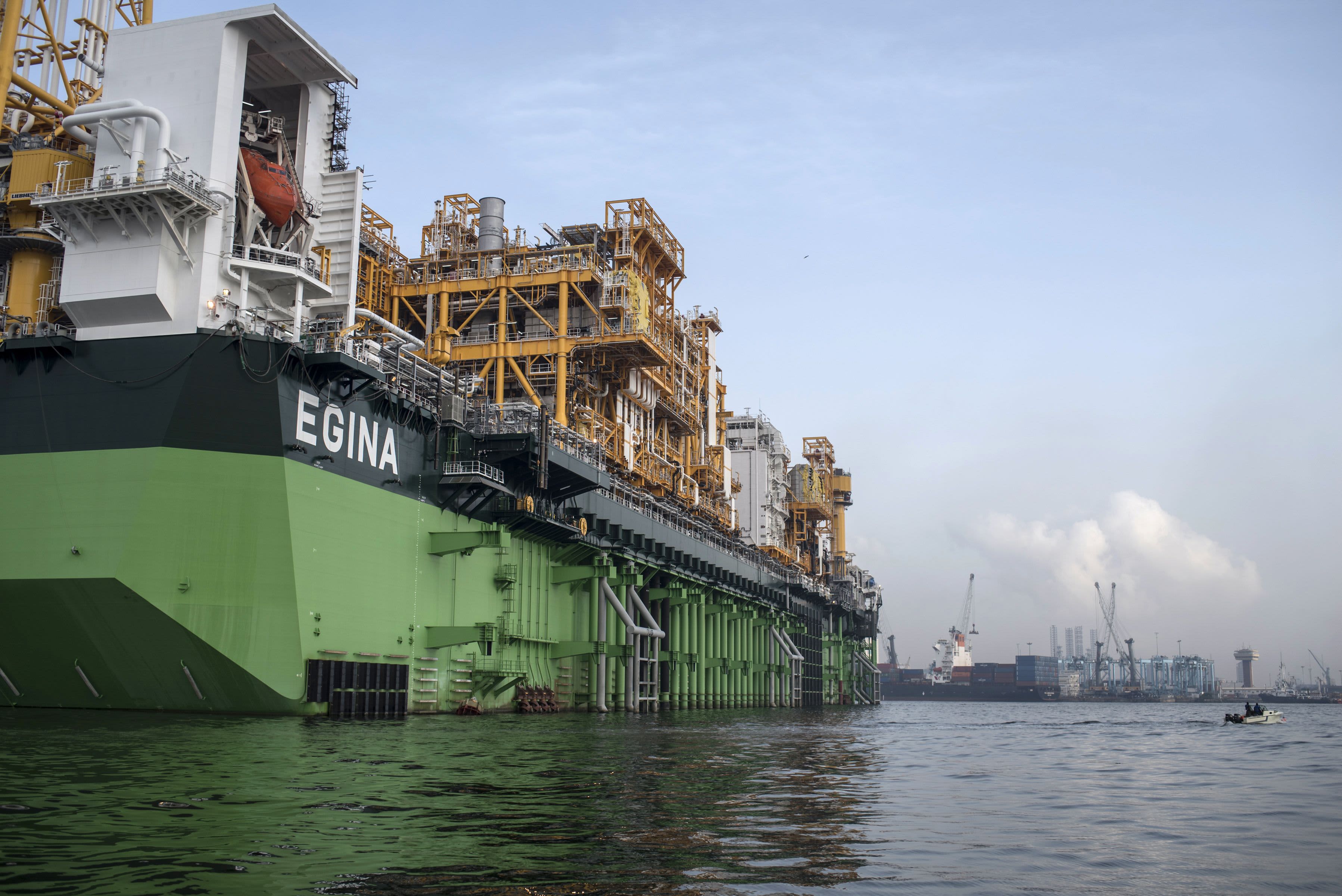This post was originally published on this site

The Egina floating production storage and offloading vessel, the largest of its kind in Nigeria, is berthed in Lagos harbor on February 23, 2017.
Stefan Heunis | AFP | Getty Images
The historic plunge in oil prices earlier this week has left some major exporters of the commodity scrambling to shore up their economies.
The U.S. West Texas Intermediate (WTI) crude contract for May delivery fell by more than 100% to settle at negative $37.63 per barrel on Monday and expired on Tuesday at $10.01 a barrel. Futures contracts trade by the month.
It comes at a time when the coronavirus crisis continues to ravage global demand, the world is awash with oil and traders are quickly running out of places to put it. Remarkably, this led to a situation where producers were effectively having to pay to get oil taken off their hands.
As of Thursday, WTI contracts for June were hovering above $15 per barrel and international benchmark Brent crude was trading above $21.50 per barrel.
Monday’s collapse came as the coronavirus pandemic obliterates global demand, furthering a price shock seen in March as OPEC and its allies, chiefly Russia, engaged in drawn out negotiations over production cuts.
An agreement by OPEC and its allies — known as OPEC+ — to reduce output by 9.7 million barrels a day from May 1 eventually put an end to a price war between Russia and OPEC kingpin Saudi Arabia. However, the absent demand arising from the pandemic has meant the deal has failed to stabilize oil prices.
The latest capitulation compounds the problems facing the countries that are most dependent on oil exports for export revenues and government income.
Nigeria
Nigeria, Africa’s largest economy, had applied for more than $7 billion in emergency funds as of Tuesday from international lenders including the IMF, World Bank, the African Development Bank, and the Islamic Development Bank.
The country depends on oil sales for around 60% of its revenue and 90% of its foreign exchange earnings, though it only accounts for 9% of GDP (gross domestic product), according to the IMF.
IMF Managing Director Kristalina Georgieva acknowledged in a recent statement that Nigeria faces “twin shocks” from the pandemic and associated oil price plunge. Meanwhile, ratings agencies Fitch and S&P have downgraded Nigeria’s credit rating in recent weeks on the back of the oil slump.
“The countries on the West Coast (of Africa) the most dependent on oil exports for export revenues and government income – Nigeria, Angola, Gabon, Congo Republic – will be scrambling to borrow from lenders who will have serious doubts about their ability to repay, and who will be tough negotiators when it comes to determining the value of the mineral assets these governments will try suggesting as collateral,” according to a research note from NKC African Economics on Tuesday.
The IMF announced on Monday that it was extending $147 million in limited conditionality financing to Gabon.
As part of the OPEC+ agreement on production cuts, Nigeria agreed to reduce its output from around 1.8 million barrels a day to 1.4 million, Oil Minister Timipre Sylva told Nigeria’s Punch newspaper on April 10, following the landmark OPEC deal.
“We currently do not expect Nigeria to reduce production by nearly that much, as the country has reflected very poor compliance with OPEC agreements in the past,” NKC Analyst Cobus de Hart said in Tuesday’s note.
“Nonetheless, pressure to reduce output has increased, and markedly lower prices could squeeze less-profitable producers.”
Russia, Saudi Arabia and the Middle East
Russia, the leader of the non-OPEC allies, relies on oil sales for around two-thirds of its export earnings and 40% of its revenue.
While the price of Russian Urals — the country’s main oil brand — did not fall below zero earlier this week, it was trading at its lowest point since 1998 at around $8 per barrel on Tuesday, according to Russian newspaper Vedomosti.
“This is not an encouraging sign for Russian economic policymakers who predicted oil prices would recover to $30-40/barrel after the OPEC+ deal comes into effect on May 1,” analysts at BMB Russia said in a note Wednesday.
While several OPEC+ members reportedly met on Tuesday to discuss bringing the implementation date forward, powerhouses Saudi Arabia, Russia, Kuwait and the UAE were not present, according to Vedomosti.
In terms of the overall economic picture for major producers, Iran is the most dependent on oil, which accounts for 65% of its GDP, followed by Kuwait (60%) and Saudi Arabia (50%).
Saudi Arabia plans to draw down 120 billion riyals ($32 billion) from its cash reserves to cushion the economic blow from tumbling oil prices and the broader impact of the pandemic, finance minister Mohammed Al-Jadaan said Wednesday. In its 2020 budget, the Kingdom assumed an oil price of $60 per barrel.
Also central to assessing the respective economic impacts is the fiscal breakeven — the price oil needs to be at across the course of a year for an individual country to balance its books.
The IMF’s projected fiscal breakeven for Saudi Arabia in 2020 sits at $76.1 per barrel. The UAE requires $69.1, Kuwait $61.1, Iraq $60.4, and Iran needs a massive $389 a barrel, according to IMF data.
In Africa, Nigeria needs $144 per barrel, Algeria needs $109 per barrel, Libya requires $100 per barrel, and Angola requires $55 per barrel, according to IMF data.




